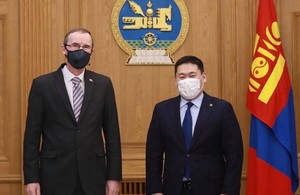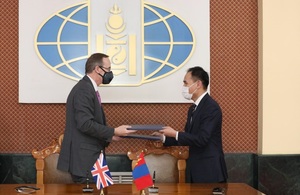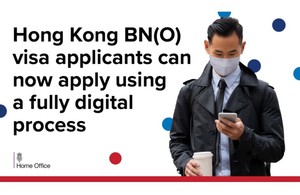- New product ensures UK exporters get paid upfront and their buyers benefit from flexible repayment terms
- Lenders can provide finance to overseas companies buying from the UK, up to the value of £30 million, with Government guaranteeing repayment
- SBLG part of government support for smaller businesses and will help them secure export contracts with overseas buyers
UK Export Finance (UKEF) today launches a new guarantee scheme that will help importers of UK goods and services obtain the financing they need, unlocking trade and boosting exports.
The Standard Buyer Loan Guarantee (SBLG) allows UKEF to guarantee a loan of up to 85% of the contract value with a UK company – typically worth between £1 million to £30 million.
As part of an overhaul to make UKEF’s supplier credit support more accessible, this ensures UK businesses get paid upfront to fulfil an export contract while their overseas buyers can repay the loan from their lender over a longer period.
Coronavirus has hit global supply chains hard with overseas buyers struggling to access the capital they need to import goods and services, restricting trade. That’s why UKEF is working with a range of new lenders to issue loans backed by SBLG.
This means UKEF’s financial support can be accessed more easily, particularly to finance smaller contracts to benefit SMEs, which will help stimulate demand for UK trade and propel economic growth as the country builds back stronger from the pandemic.
Minister for Exports, Graham Stuart, said:
The UK is one of the world’s top five exporting nations, supporting well paid jobs in every region and nation across the country. We are determined that this should continue, so this new scheme from our world-leading export finance agency, UKEF, will help our exporters reach buyers they would otherwise miss – and build back stronger from the pandemic.
Northern Irish firm first to benefit
Northern Irish company, CDE Global, provide wet processing equipment for construction and recycling operations, and is among the first to benefit from SBLG’s pilot programme.
CDE secured a multi-million pound contract with a Tunisian customer to expand the production capabilities at a silica quarry in Oueslatia. In absence of a financial solution from the commercial market to support extended repayments in Tunisia, CDE contacted UKEF for support who offered a nine-year facility to finance the contract for their buyer. This significantly boosted CDE’s turnover and helped support jobs at the firm. You can find more details about the deal here.
The financing was arranged by AF Capital Partners, which is a new partner for UKEF as part of its initiative to support smaller deals.
CDE’s Chief Executive Officer, Marc Jennings, said:
This is the second time we’ve partnered with UKEF. Its export sales support facilitated the development of a major recycling project in Europe, a very important sector for our future growth.
The finance facility offered by UKEF for this new project, a second silica sand wet processing plant for our customer Sebri Group, is a boost to our business, sustaining engineering manufacturing roles, and the access to finance ensures our customer can continue to invest in the best solution to help them grow.
This scheme allows buyers to make their choice based on the quality of the goods alone. For CDE, it has single-handedly brought an export contract to the UK that was otherwise being awarded to a German competitor. We look forward to being part of a product that can grow UK exports for many years to come.
Background
About UK Export Finance
UK Export Finance is the UK’s export credit agency. It exists to ensure that no viable UK export lacks for finance or insurance from the private market, providing finance and insurance to help exporters win, fulfil and get paid for export contracts.


